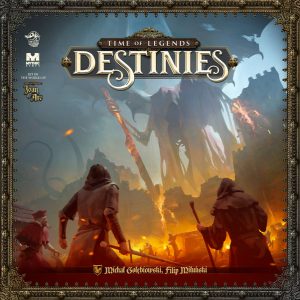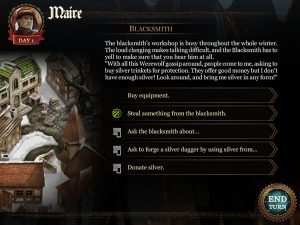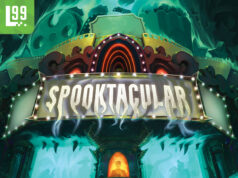Note: This preview uses pre-release components and rules. What you see here may be different from the final, published game.

Prepare to enter the dark medieval-fantasy universe of Time of Legends: Destinies. Lucky Duck Games, in cooperative with Mythic Games (Original creator of the Time of Legends: Joan of Arc) is bringing their scanning technology found in Chronicles of Crime to the Joan of Arc wold. This is a story-driven, competitive game of exploration and adventure. That’s right, players aren’t working together to take down the bad guy, it’s a race to see who can be the first to fulfill their destiny.
Gameplay Overview:
Learning to play Destinies is surprisingly easy. Each player starts off with a unique character who has a secret destiny the player is trying to fulfill. For our prototype copy, we had one scenario to test out (Howl) along with three characters. A werewolf is murdering people and we have to put a stop to it. Each player gets a player board that has three skill tracks on it, and the integrated app tells you which skill tokens to place and where.

On a player’s turn, they can move up to two tiles and take an action. Actions involve interacting with a point of interested (POI) on the game map through the integrated app. You might talk to a blacksmith, fight a wolf, or explore a catacomb. Clicking on the POI in the app will provide you with the relevant options.
Many interactions will involve skill tests. Each player has two main dice to roll and can optionally roll up to 3 effort dice (when used, effort dice are refreshed at a rate of one per turn). They then sum the total on their dice and check their skill track. Each skill token on a number equal or less than the sum of their roll counts as one success. The total is inputted in the app and it will give the player their results.
Players can also interact with people and ask them questions. This is sometimes handled by Lucky Duck Games QR scanning technology (found in Chronicles of Crime). If you want to ask the innkeeper about the silver dagger you are holding, just scan its code while you are talking to him and he will say what he knows (sometimes).
Players will take turns in this manner, exploring the world and interacting with points of interest. Once they think they’ve not only figured out what they need to do to fulfill their destiny, they must travel to the appropriate spot and pass a series of tests or use required items. Sometimes this step can take multiple turns if rolls are failed or if a player needs to go find something they don’t have. However, the first player to fulfill their destiny wins.

Gameplay Impressions:
Time of Legends: Destinies was a really interesting game experience. I’ve found that the game focuses more on the story and exploration rather than dice chucking combat. I think during our 2-hour game we had maybe 4-5 combat encounters? That’s not to say we didn’t have to do many tests, but they were for a variety of things (healing someone, tanning hides for money, trying to open a door, etc…). That, combined with the skill progression system, goes a long way towards fulfilling Destiny’s claim of being an RPG-light board game.

Speaking of the progression system, I thought that this was a really clever mechanic. Players have three tracks (intelligence, agility, and strength) and will start out with a handful of points in each (usually being good at one and crappy at another). Doing various things in the world will grant experience points, which can be used to add more skill tokens. The point costs are weighted, so tokens on lower numbers (1-4) cost 4 experience points, while the lower probability numbers (10+) only cost a single point. So do you bank those experience points and use them on numbers you will hit every time? Or do you spend them right away fo the higher numbers which you can only hit with lucky rolls or the effort dice?

The effort dice was also a fun system that forced hard choices on the players. Since you only gain one back per round (short of visiting specific POIs on the map), you have to decide when to best spend them. Do I use all three on this test with the Romani, but then have none left for follow up tests? Or do I play it conservative and only roll 1, hoping for a bit of luck. Thankfully, not everything requires tests, with some turns having downtime where you can allow them to refresh.
Finally, I found that Time of Legends: Destinies does a good job of sucking you in with its story. This is in part thanks to the fact that every interaction in the app is read aloud. It may seem a bit odd to hear what a priest is saying from the other side of the town, but it definitely helps to keep the game flowing. Destinies is not a short game, so this helps cut down having players repeat the same actions others did. While this can inadvertently help your opponents by reading the text they need or finding POIs that are relevant to their character, it does have the added benefit of keeping players interested when it’s not their turn.
Final Thoughts:
Our play of Time of Legends: Destinies took about two hours and, to be honest, the time flew by for us. I was so engrossed in the story and trying to figure out my destiny that I lost track of time. After it was over (a close contest), I found myself wanting to play the next mission soon. The smooth mechanics of the gameplay helped move this one along and, unlike in Chronicles of Crime, I found that the QR scanning was unobtrusive and used just about the right amount.
I still find myself on the fence whether I like the competitive nature of the game, or if I’d prefer it to be cooperative so I could work with a friend to figure out our Destinys. In either case, Lucky Duck has definitely put a unique spin on the genre and I’m very much looking forward to trying this one again.
If you’d like to check it out for yourself, Time of Legends: Destinies is currently in funding on Kickstarter. So head over to the campaign page for more information, or to become a backer.
As always, we don’t post ratings for preview copies as the components and rules may change from the final game. Check back with us after the game is produced for a full review.






















Dear Tony! I have enjoyed Chronicles of Crime, however I don’t really fancy the concept of competitive detective deductive gameplay. Do you think Time of Legends: Destinies could be home-ruled or tweaked so that it works cooperatively? This is to ask, is the story good/complex enough?
I don’t mind if there is no time pressure, and if there is, I often disregard it because it seldom makes for a better experience for me (see Sherlock Holmes: Consulting Detective or Chronicles of Crime).
I’ve only been able to play the first scenario, so I really can’t answer that. Your best bet would be to ask the publisher directly on their Kickstarter page.